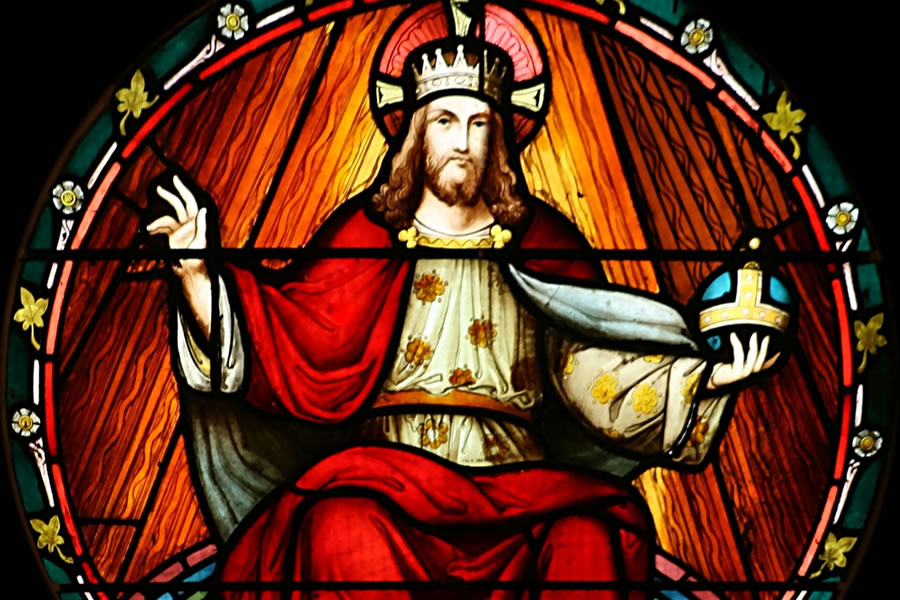
Solemnity of Christ the King
11-20-2022Weekly ReflectionDr. Scott HahnWeek by week the Liturgy has been preparing us for the revelation to be made on this, the last Sunday of the Church year.
Jesus, we have been shown, is truly the Chosen One, the Messiah of God, the King of Jews. Ironically, in today's Gospel we hear these names on the lips of those who don't believe in Him - Israel's rulers, the soldiers, a criminal dying alongside Him. They can only see the scandal of a bloodied figure nailed to a cross. They scorn Him in words and gestures foretold in Israel's Scriptures (see Psalm 22:7 -9; 69:21-22; Wisdom 2:18-20).
If He is truly King, God will rescue Him, they taunt. But He did not come to save Himself, but to save them - and us. The good thief shows us how we are to accept the salvation He offers us. He confesses his sins, acknowledges he deserves to die for them. And He calls on the name of Jesus, seeks His mercy and forgiveness.
By his faith he is saved. Jesus "remembers" him - as God has always remembered His people, visiting them with His saving deeds, numbering them among His chosen heirs (see Psalm 106:4-5).
By the blood of His cross, Jesus reveals His Kingship - not in saving His life, but in offering it as a ransom for ours. He transfers us to "the Kingdom of His beloved Son," as today's Epistle tells us. His Kingdom is the Church, the new Jerusalem and House of David that we sing of in today's Psalm. By their covenant with David in today's First Reading, Israel's tribes are made one "bone and flesh" with their king. By the new covenant made in His blood, Christ becomes one flesh with the people of His Kingdom - the head of His body, the Church (see Ephesians 5:23-32).
We celebrate and renew this covenant in every Eucharist, giving thanks for our redemption, hoping for the day when we too will be with Him in Paradise.
A service of the St. Paul Center for Biblical Theology www.SalvationHistory.com.
La Solemnidad de Cristo Rey
El reino de Cristo es misterioso y aparece en esta escena como oculto. El Papa Francisco comentaba que este evangelio presenta la realeza de Jesús “de una manera sorprendente. "El Mesías de Dios, el Elegido, el Rey" se muestra sin poder y sin gloria: está en la cruz, donde parece más un vencido que un vencedor. Su realeza es paradójica”. Y el Papa concluía: “la grandeza de su reino no es el poder según el mundo, sino el amor de Dios, un amor capaz de alcanzar y restaurar todas las cosas. Por este amor, Cristo se bajó hasta nosotros, vivió nuestra miseria humana, probó nuestra condición más ínfima: la injusticia, la traición, el abandono; experimentó la muerte, el sepulcro, los infiernos. De esta forma nuestro Rey fue incluso hasta los confines del Universo para abrazar y salvar a todo viviente”.
San Lucas es quizá el evangelista que más ha subrayado este amor misericordioso de Jesús durante su pasión; un amor capaz de soportarlo todo para salvarnos. Es quien recoge por ejemplo el ruego de Jesús al Padre por sus verdugos ; y narra uno de los episodios lucanos más característicos: la conversión del buen ladrón, que aparece en esta escena como la primicia de la victoria de Cristo y de su misterioso reinado.
Por otro lado, el buen ladrón manifiesta una disposición fundamental demandada al otro ladrón: “¡ni siquiera tú, que estás en el mismo suplicio, temes a Dios!” . El temor de Dios significa aquí asumir con responsabilidad y sinceridad las consecuencias de los propios actos, sin echarle a Dios la culpa de ellos. Es lo que el ladrón le explica al otro malhechor: “Nosotros estamos aquí justamente, porque recibimos lo merecido por lo que hemos hecho; pero éste no ha hecho ningún mal”. El temor de Dios mueve al buen ladrón a reconocer y confesar su culpa. Así pasa, mediante la contrición, del temor al amor: “¡Acuérdate de mí cuando llegues a tu Reino!”. Y recibe entonces no solo el perdón de Dios sino también la promesa del paraíso. Como explica san Ambrosio, “el Señor concede siempre más de lo que se le pide."
BACK TO LIST